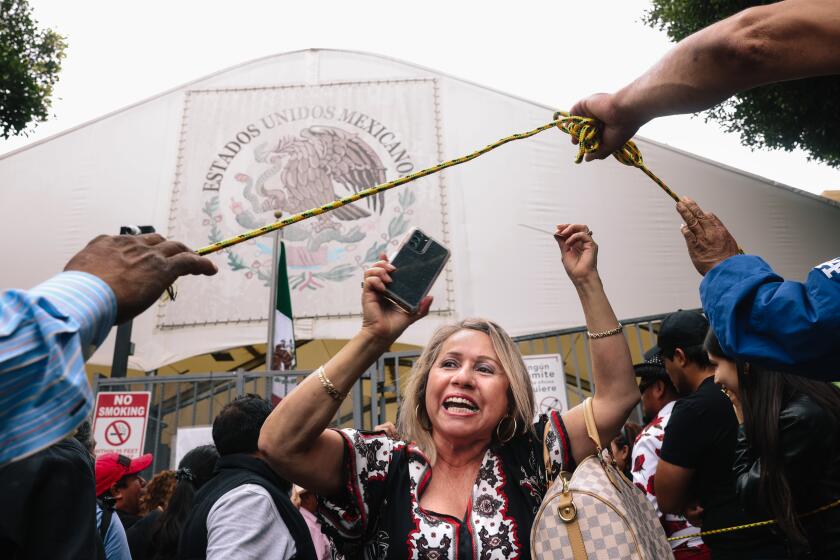CHP Officer Ordered to Stand Trial in Killing of San Diego Student
California Highway Patrol Officer Craig Peyer was ordered Monday to stand trial for the murder of a university student who was strangled in an isolated area near a freeway off-ramp and whose body was thrown from a bridge.
Peyer, 37, a 13-year-CHP veteran, showed no emotion when Municipal Judge Frederic L. Link concluded a preliminary hearing by saying “the court finds a strong suspicion that (Peyer) committed the crime.”
Peyer, who is on administrative leave and still drawing his $33,000-a-year salary, is free on $1 million bail.
Peyer is accused in the murder of Cara Knott, 20, a student at San Diego State University who died the night of Dec. 27 after her car pulled off the Mercy Road off-ramp of Interstate 15 north of downtown San Diego. Her body was tossed off a bridge and into a dry creek bed, where it was discovered the next morning.
Link bound Peyer over for trial after listening to 57 witnesses produced by the prosecution over a five-day period. Nineteen young women testified that Peyer pulled them over while they were driving at night on Interstate 15 and ordered them to drive down the darkened Mercy Road off-ramp, where he engaged some women in conversations that lasted as long as one hour and 40 minutes. All of the women testified that Peyer stopped them for minor infractions, usually for having a faulty headlight or taillight.
‘Outside the Policy’
The women said they were stopped in 1986, and Peyer never touched them or asked them for a date. But Link said that Peyer’s conduct “in luring young women to a darkened Mercy Road off-ramp” was “outside the policy of the CHP.”
Several witnesses, including CHP officers, testified that they saw scratches on Peyer’s face the night Knott was murdered.
Earlier Monday, Gary Harmor, a serologist with the Serological Research Institute in the Bay Area, testified that a blood spot found on Knott’s sweat shirt matched Peyer’s blood type. Harmor said that he used a complex and sophisticated scientific test to match the so-called genetic markers derived from the blood spot on the sweat shirt to genetic qualities found in a sample of Peyer’s blood.
Although Harmor did not say that the blood spot on the sweat shirt definitely came from Peyer, he said that only 1.33% of the world’s population has similar genetic markers in their blood. This percentage amounts to one in every 75 Caucasians and not at all in non-Caucasians, Harmor said.
Gold Thread Studied
The list of scientific evidence also included a microscopic piece of gold thread found on Knott’s sweat shirt. A San Diego police hair-fiber expert testified last week the thread matched thread samples found on the California Highway Patrol patches taken from Peyer’s uniform jacket.
Peyer will return to court May 18, when a Superior Court judge will set a trial date. The case is expected to go to trial some time in July.
Peyer is the second CHP officer ever charged with committing murder while on duty. In 1984 CHP Officer Michael Gwaltney was convicted in a civil rights homicide case stemming from the rape and killing of a young woman he stopped in the desert near Barstow.
More to Read
More to Read
More to Read
Start your day right
Sign up for Essential California for news, features and recommendations from the L.A. Times and beyond in your inbox six days a week.
You may occasionally receive promotional content from the Los Angeles Times.






